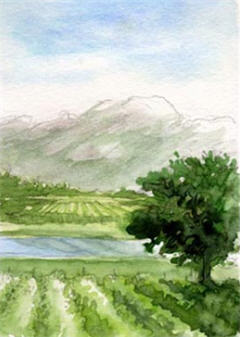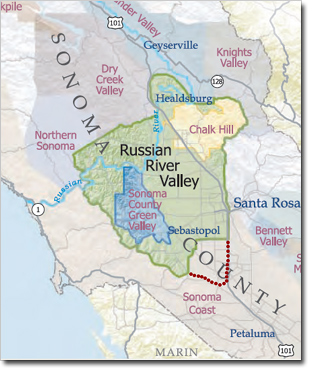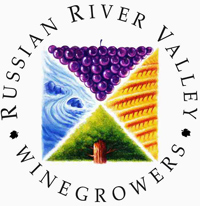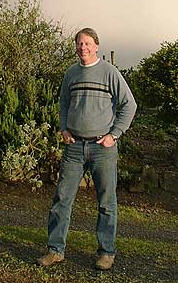

Those against Gallo's push for RRV expansion say its growing conditions are unique and annexing a portion of Sonoma Coast AVA is incongruous.
Gallo Wants a Russian River
Valley AVA Expansion
Gallo of Sonoma's controversial TTB petition seeks to expand the boundaries of the Russian River Valley AVA. The petition has met considerable opposition from others in the region who believe the proposed addition dilutes the value of the current appellation and benefits only Gallo.
by
Dan Berger
October 22, 2008
 oes the name “Russian River Valley” on a bottle of wine carry such prestige it’s worth fighting to rewrite the area’s boundary line?
oes the name “Russian River Valley” on a bottle of wine carry such prestige it’s worth fighting to rewrite the area’s boundary line?
It does for the E&J Gallo Winery, which has filed a petition with the Treasury Dept.’s Alcohol and Tobacco Tax and Trade Bureau, seeking to increase the size of the appellation to include its vineyards south and west of Santa Rosa, adjacent to the towns of Cotati and Rohnert Park. (see petition document)

The current Russian River Valley AVA boundaries are outlined in green with the proposed area for expansion marked in dotted red. (approximate only)
(map courtesy of RRVW)
Despite its easterly location, distant from the county’s coastline, the area proposed for inclusion in Russian River is one of the coolest wine-growing regions in the state. And as such some might be persuaded that it is Russian River-like. However, some of those opposed to the Gallo plan say that the region is actually cooler than Russian River as it is now constituted, and, in any case, is hugely different.
Gallo submitted an extensive analysis to supports its claim that an additional 14,044 acres of land should be included in the Russian River appellation, including climate data showing the cool temperatures at its seven vineyard sites. Each of the vineyards has fewer than 2,800 degree days and thus the area “has the same climate as the current Russian River Valley,” said the petition.
The Case for Expansion
The supporting evidence which Gallo included with its petition appears impressive, and includes research on weather, topography and elevation, soils and geology, and a list of average Brix for some winegrowers in the current viticultural area as well as the proposed expansion.TTB stated in its report in the Federal Register that it had received more than 50 letters of opposition to the proposed expansion of the Russian River area, most of which argue that “the proposed expansion area falls outside the coastal fog line and thus has a different climate than that of the current viticultural area.”
(see public comments regarding this proposal)
The Russian River Valley Winegrowers, the organization that supports the existing area, is a non-profit group, and as such has decided (after much heated discussion) to take no formal position on the Gallo proposal.
 “As a non-profit [organization], you have to be very careful about what you do,” said Rod Berglund, owner/wine maker at Joseph Swan Vineyards and a member of the Russian River Valley Winegrowers’ board of directors.
“As a non-profit [organization], you have to be very careful about what you do,” said Rod Berglund, owner/wine maker at Joseph Swan Vineyards and a member of the Russian River Valley Winegrowers’ board of directors.
Berglund, who was one of the key forces behind the original RRV boundary as well as its 2005 adjustment, said that individuals in the group may make their personal opinions known, even if they do not reflect the opinion of the group, and he was pleased to go on the record in opposition to the Gallo proposal.
Clearly supportive of the move is Jim Collins, chief viticulturalist for Gallo, who was likewise pleased to support the petition. Asked about the argument that the fog in the proposed appellation addition was somehow different from the fog that invades the existing area, he noted: “I have heard that argument, and I don’t know how would you differentiate [any difference],” he said. “The weather patterns of the area indicate that the fog comes from the same area.
“And frankly, I don’t know how you would tell what differences there could be. Speaking from my experience, I don’t see any difference between that fog and the same kind of fog that we get at our Laguna and MacMurray Ranch properties.”
As for the differences in physical appearance and agricultural divergences seen between the more northerly and southerly districts, Collins said he wasn’t sure that was a particularly germane argument. He added that the Gallo properties are located “not really over the ridge in the Petaluma area,” but where the Petaluma Wind Gap sends its gusts, in more northerly Cotati. And as for the agricultural and timber differences, he added, “I don’t think it’s entirely accurate” to say that what historically grew in the areas was definitively one thing or another.
”I can’t go back in time to see where the fruits and vegetables and redwoods were growing, but the soils are the same.”
Collins note that in 2005, when the Russian River Winegrowers were seeking TTB approval to change their boundary line, “We did approach them at that time, and asked them to include this. But we all agreed it would have held up their approval process, so the board asked us to wait, to avoid the delay.”
“The TTB system is an imperfect system.”
Getting any appellation boundary approved by TTB is always an arduous process, and especially when there are strong and scientifically supported positions both in favor and opposed to the petitions. Moreover, as Berglund said, “The TTB system is an imperfect system.”When asked what he meant by that remark, Berglund suggested that many TTB specialists have never seen the areas in question. “We’re out here, living here every day, living with and working with these crops,” he said. “Around here the

Rod Berglund, owner and winemaker, Joseph Swan Vineyards
He noted that it’s often necessary to show the historical use of the name being used, “but frequently it’s done in such broad brush strokes that it’s hard for people to argue in specific terms. And the reason is, they are not sitting on the ridge tops and walking along the streamside vistas, and seeing what we see, living what we live.”
He was asked if he supported the petition. “I do not. Look, I grew up in Petaluma, and I went to Petaluma High School and I have been in th










 READER FEEDBACK: To post your comments on this story,
READER FEEDBACK: To post your comments on this story,



